 Petzlover
Petzlover Ariege Pointer is originated from France but Ryukyu Inu is originated from Japan. Ariege Pointer may grow 17 cm / 7 inches higher than Ryukyu Inu. Both Ariege Pointer and Ryukyu Inu are having almost same weight. Ariege Pointer may live 3 years more than Ryukyu Inu. Both Ariege Pointer and Ryukyu Inu has same litter size. Both Ariege Pointer and Ryukyu Inu requires Low Maintenance.
Ariege Pointer is originated from France but Ryukyu Inu is originated from Japan. Ariege Pointer may grow 17 cm / 7 inches higher than Ryukyu Inu. Both Ariege Pointer and Ryukyu Inu are having almost same weight. Ariege Pointer may live 3 years more than Ryukyu Inu. Both Ariege Pointer and Ryukyu Inu has same litter size. Both Ariege Pointer and Ryukyu Inu requires Low Maintenance.
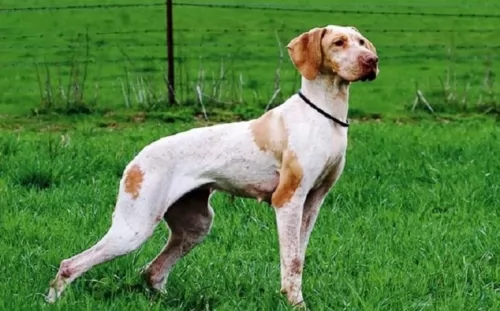 The Ariege Pointer is a French hunting dog, coming from the Ariegeois region of France.
The Ariege Pointer is a French hunting dog, coming from the Ariegeois region of France.
Known as the Ariege Pointing Dog, French Pointer or Braque de l’Ariege, these dogs came from the old French Braque dogs that were crossed with the orange and white Southern Braques.
It was in 1990 that a team of breeders decided to devote themselves to the breed’s survival. The Braque de l’Ariege was recognized by the United Kennel Club in 2006.
 The Ryukyu Inu is a medium-sized dog that comes from Okinawa, Japan.
The Ryukyu Inu is a medium-sized dog that comes from Okinawa, Japan.
It’s a dog that is fairly rare having been used to track boar. There isn’t much information on the dog’s history but after its numbers declined after World War II, there was an urge in the 1980s to save the breed.
The dog isn’t recognized by any major Kennel Clubs.
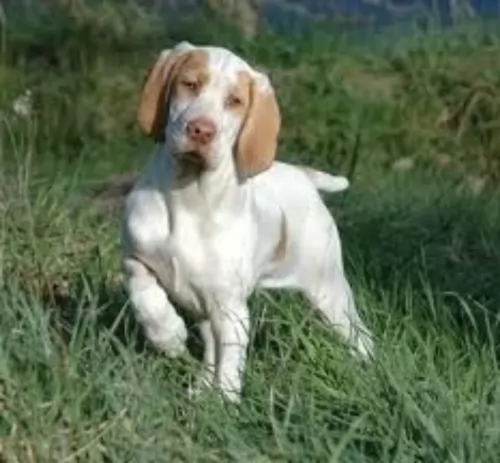 The Ariege Pointer has always been a dog kept essentially for hunting and not as a companion dog. He stands between 55 – 67cm and weighs 25 – 30kg.
The Ariege Pointer has always been a dog kept essentially for hunting and not as a companion dog. He stands between 55 – 67cm and weighs 25 – 30kg.
He is an attractive looking dog with quite a large head while the body is sleek and slender to look at. The ears are quite large and are floppy while the tail is traditionally docked to give him that distinctive look. These days the tail is often left long and hangs downwards.
The coat is short, single and rough and is white with tan or orange patches. The coat can also be speckled or ticked.
The Ariege Pointer is a hunting dog who is friendly towards strangers and therefore won’t make a particularly good watchdog.
These dog are lively, independent and good natured and they make excellent companion dogs. They are fairly docile and and get on well with children and pets in the home. Just like with any other dog, they need to be trained and socialized early.
 Japanese dog breeds end with the word ‘Inu’ or ‘Ken’ . It means ‘dog’.
Japanese dog breeds end with the word ‘Inu’ or ‘Ken’ . It means ‘dog’.
The medium sized Ryukyu Inu stands at between 46 to 50cm in height and weighs between 15 to 25kg. He has a black nose, dark brown eyes and erect ears. The tail is long and curls over the back.
The dog’s coat is short and you get the single- and double coated varieties. The coat can be brindle, red, white, liver or black. Some of the dogs have tiger-like stripes in the coat. People are amazed at these dogs as they have incredible climbing abilities and are even capable of climbing a tree.
These dogs are quiet, unobtrusive dogs. The Ryukyu Inu looks very much like a wild dog, which gives the impression of being un-trainable and ferocious but they are easily trained and make splendid pets.
Many people who have had them as pets say they would choose this dog over and over again. They are brave too and get on well with children or pets in the home. They don’t look for trouble, and their kind, stable natures make them excellent therapy dogs.
They’re intelligent dogs and will require plenty of mental and physical stimulation. They will also need to be trained and socialized as they are confident, strong-willed dogs who might not obey you if left to do what they want.
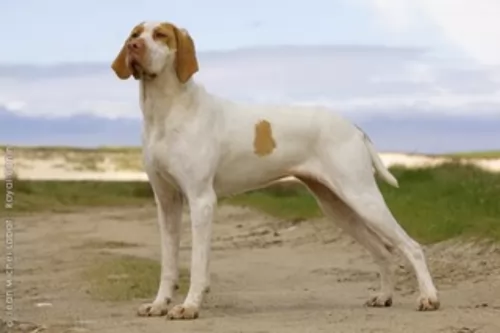 The Ariege Pointer has always been an excellent pointing- and hunting dog. When it comes to being a family pet, he puts his hunting skills aside and becomes a loyal, loving, friendly pet.
The Ariege Pointer has always been an excellent pointing- and hunting dog. When it comes to being a family pet, he puts his hunting skills aside and becomes a loyal, loving, friendly pet.
They are considered to be rare dogs, and were at one time bordering on extinction. Those who have owned one of these hunting dogs will be glad to know that they are no longer considered endangered. They’re not your friendly, social kind of dog that you find in other dog breeds, but with training and socialization he will make a fine companion and family friend.
 This dog has always been a hunting dog so he will want to have his fair share of good exercise – long walks as well as ball and rope games.
This dog has always been a hunting dog so he will want to have his fair share of good exercise – long walks as well as ball and rope games.
He makes a splendid pet because he has an amicable nature wanting to please. He is quiet, loving and loyal, and with such a dog in your home and heart, you just keep discovering what a wonderful pet this 4-legged friend can be.
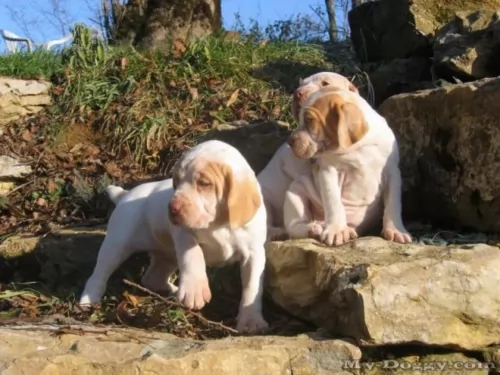 The Ariege Pointer is a working dog breed, used for hunting and retrieving prey. With good care the dog can live to be a good 12 – 15 years of age.
The Ariege Pointer is a working dog breed, used for hunting and retrieving prey. With good care the dog can live to be a good 12 – 15 years of age.
However, with every dog breed there are common dog diseases to watch for. This dog has long floppy ears and these can get damp and will need to be cleaned and dried regularly otherwise the long ears can be prone to infection.
Apart from being prone to health issues such as an ear infection, you want to be aware of very common dog ailments such as hip dysplasia which can cause lameness in your dog.
Whatever illness your dog has, and you see he isn’t acting his usual self, get him to the vet for a check-up and then make sure that all treatment and medication prescribed is adhered to.
 These Japanese dogs are thought to be fairly healthy dogs, but like with most other dogs, you would need to be aware of hip dysplasia, bloat, caner and hypothyroidism.
These Japanese dogs are thought to be fairly healthy dogs, but like with most other dogs, you would need to be aware of hip dysplasia, bloat, caner and hypothyroidism.
The Ryukyu Inu, with its 10 to 12 years lifespan, will be prone to minor ailments, but with good care he is not likely to succumb to any of them.
Cataracts have a number of causes in dogs. This disease of the eye can occur at any age, and can develop over weeks or even years.
Cataracts can occur in just one eye or both eyes and a disease such as diabetes can bring on a cataract.
Good nutrition is important for a dog to build a strong immune system, and nutritional supplementation can certainly help to enhance lens health. Cataract surgery can be performed to remove the cataracts.
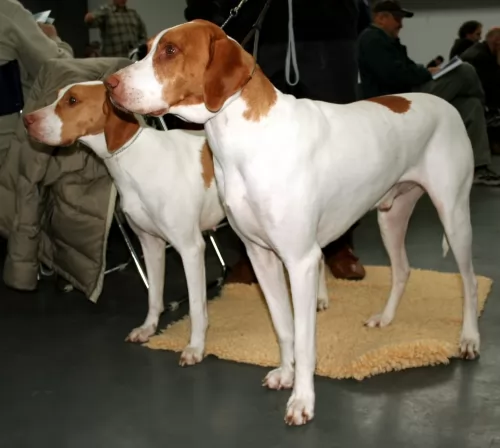 Your attractive Ariege Pointer will give birth to 2 – 8 puppies. If you don’t want puppies, then spaying or neutering is excellent and can actually have many health benefits for your pet.
Your attractive Ariege Pointer will give birth to 2 – 8 puppies. If you don’t want puppies, then spaying or neutering is excellent and can actually have many health benefits for your pet.
This dog with its short coat requires very little maintenance, and a good brush twice a week will ensure the coat remains glossy and shiny, giving you the chance to also check for fleas and ticks.
Don’t just assume every dog has bad breath. Bad breath can be indicative of dental disease, and dental problems can cause all kinds of other illnesses within the body. Make sure that while your pet’s teeth are healthy, that you brush them 2 or 3 times a week with special canine toothbrush and toothpaste.
The Ariege Pointer requires regular exercise as it is a lively, energetic dog. He can adapt to life in the city or the country, but ideally he needs a place with a large garden.
Wherever you keep him as a pet, make sure you take him for walks every day and that you play ball- or rope games with him. Ignoring his exercise needs will turn him into a bored, frustrated pet, and that isn’t fair towards him.
Make sure you choose good quality commercially manufactured foods for him. Adding in some home-made food to his kibble such as cooked brown rice, vegetables and chicken will be wonderfully good for him.
Every dog will require some raw meat added into his diet from time to time. Many skin diseases can be treated by adding in raw meat. After all, before dogs were domesticated they lived on raw meat, and including this ingredient back into their diet guarantees to make a remarkable difference in terms of good health.
 The coat of the Ryukya Inu requires brushing twice a week to remove loose hairs. At the same time check your dog over for new lumps and check inside his mouth for bad teeth. Bad teeth can cause lots of pain and toxins within the body. You can also choose to have the teeth seen to and cleaned by your vet.
The coat of the Ryukya Inu requires brushing twice a week to remove loose hairs. At the same time check your dog over for new lumps and check inside his mouth for bad teeth. Bad teeth can cause lots of pain and toxins within the body. You can also choose to have the teeth seen to and cleaned by your vet.
Provide him with his own warm, dry place to sleep.
Provide him with top quality food. There are some excellent commercially manufactured foods on the market that make a point of ensuring good ingredients in them. Your Ryukya Inu needs good food to ensure longevity and health.
Try to include some home-made food for him which can be simply mixed into the dry kibble twice a week. Boiled chicken, brown rice or pasta and spinach, sweet potatoes and carrots is super tasty and nutritious. This food can all be chopped up, refrigerated and added warmed up and in small portions to your pets dry kibble once or twice a week. Your dog will love it.
Ensure there is always a bowl of fresh, cool water within his reach.
Have him neutered or spayed if you aren’t wanting puppies.
Keep his vaccines up to date against some deadly canine diseases.
Get him to the vet when he is injured, in pain or sick.